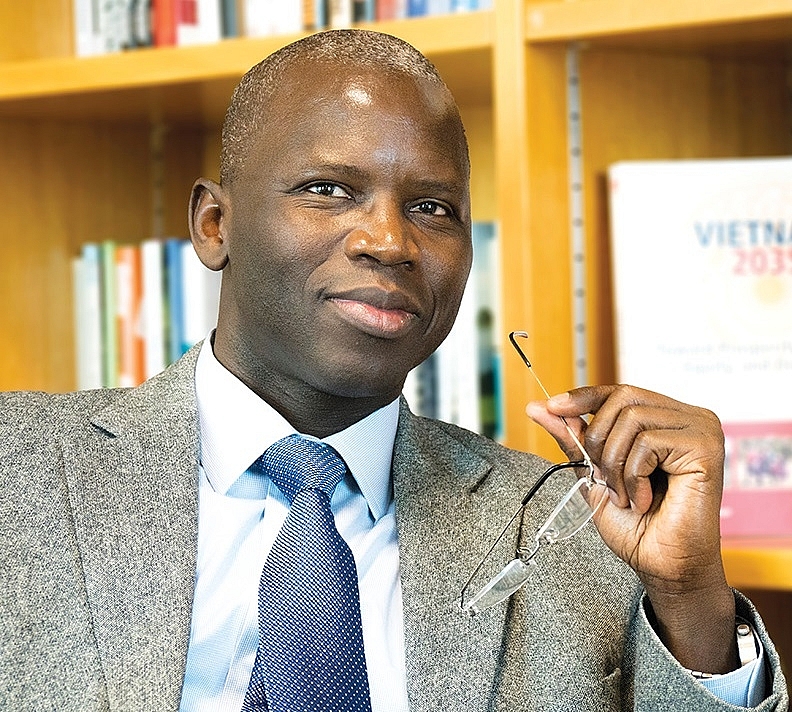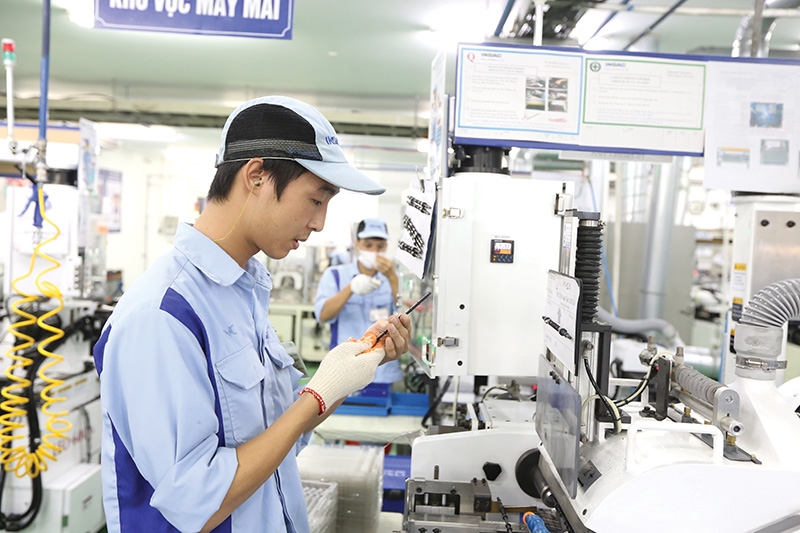Optimising the recovery route ahead for Vietnam as a whole
 |
| Ousmane Dione - Country director for Vietnam World Bank |
It is also the spirit shown in the meeting between the prime minister and the private sector more than a week ago. Ensuring that Vietnam emerges from the current crisis the world still faces to a sound economic recovery is of critical importance as the country eases social distancing restrictions.
Vietnam’s health response to the ongoing pandemic has been exceptional. With strong leadership and a proactive response, Vietnam has managed to contain the number of infections.
The government’s singular focus on keeping its people healthy and safe during this period of crisis has instilled a strong sense of trust in the authorities. After all, the primary wealth of a nation is the good health of its citizens.
At the same time nurturing the health of businesses, especially the private sector, is caring for the economy and workers’ sustainable livelihoods. This mirrors very much Party General Secretary, State President Nguyen Phu Trong’s vision in confronting the pandemic: “The biggest tasks are to develop production and ensure people’s lives.”
According to our most recent regional economic update, Vietnam’s economy has been resilient. In sharp contrast with the trends observed around the world, many businesses in Vietnam have increased their sales abroad, while potential investors are still coming in large numbers. More than $12 billion in foreign direct investment (FDI) have been registered since the beginning of this year.
This extraordinary resilience, however, has to be tempered in view of the harsh realities of the pandemic, and these realities are known to all of us. According to the Vietnam Chamber of Commerce and Industry (VCCI), a record number of businesses (nearly 35,000) stopped operation in the first quarter of this year. As a consequence, by the end of March, approximately three million workers were affected, of which 59 per cent were temporarily out of work, 28 per cent were taking turns to work, and the remaining 13 per cent had lost their jobs.
 |
| Unlike some other regional countries, Vietnam is already looking past the pandemic, preparing to reboot its economy, Photo: Dung Minh |
Getting back on track
The situation will continue to unfold in the coming months. The good news is that the gradual easing of social distancing restrictions initiated since April 23 is expected to reduce the pressure on both business and workers. As the economy embarks on a recovery path, each new day presents new opportunities to become stronger. It is imperative to seize these opportunities by pursuing the right policies.
Understanding the impact of COVID-19 on businesses is a prerequisite for good policymaking, otherwise there are risks – the risk of wasting scarce public resources and the risk of sending the wrong signals to the markets.
The economic shock of the pandemic is being transmitted to businesses through four channels: falling demand, the disruption in the supply of inputs, tightening of credit conditions and a liquidity crunch, and rising uncertainty.
While most firms in Vietnam have been negatively affected by the crisis through one or more of these channels, significant variations can be observed by sectors or activities. While farms appear marginally impacted, businesses operating in the transport and tourism sectors are today in severe financial distress.
There are also large differences depending on firms’ size, ownership, and location. Businesses in densely populated urban centres are generally more affected by social distancing measures and mobility restrictions than those in rural areas. Lastly, the fragility of businesses also depends greatly on the restrictive measures in place in Vietnam and, for those trading internationally, in other countries.
Collecting evidence on the impact of the coronavirus will require innovative solutions as traditional information channels might be too slow in the current context. These solutions may include just-in-time information collected from firms through mobile phones surveys or the use of big data provided by global partners such as Google, with satellite observations for tracking the progress of the pandemic and the speed of economic recovery. The World Bank Group is supporting the Indonesian government in this effort by creating a new information observatory, and is ready to do the same in Vietnam. Concurrently, the Vietnamese government must think how to best support businesses in both the short and long term. Although many solutions will have to be tailored to the specific needs of firms and/or sectors based on hard evidence, there are at least three guiding principles that can inform policymaking.
Providing encouragement
The first guiding principle is to provide immediate support to firms that are the most affected by the crisis and are expected to rebound quickly when the economy will rebuild gradually.
To avoid persistent negative effects on economies and workers, it is critical that viable firms do not exit and that financial institutions continue to provide access to credit and working capital for businesses in a sustainable way.
It is equally essential that measures taken do not exacerbate financial risks. Governments have a variety of tools to choose from to support firms, including fiscal solutions such as temporary tax breaks and deferrals, grants and fee reductions, and eligible direct cash transfers to small and medium-sized enterprises (SMEs) with a good credit history and ability to pay back; one-time grants to sizeable informal businesses that decide to formalise; a special relief facility in working capital loans for SMEs with an annual capped interest rate; tourism solidarity funds that promotes specific destinations by the tourism board, travel discount vouchers in coordination with airlines, resorts and hotels; and income tax relief to individuals for expenses incurred for domestic tourism.
Vietnam has already been moving on this front, notably through the series of measures taken by the Ministry of Finance and the State Bank of Vietnam to ease the liquidity crunch and credit conditions and by the fiscal packages announced by the government in early April.
The second principle is to encourage the reallocation of resources away from businesses that are not expected to rebound quickly or that will have to change their ways to conduct business in the aftermath of the pandemic, which will become increasingly “contact-free”.
The government can stimulate the reallocation of resources toward more profitable activities. Like in Singapore, taxi drivers could be incentivised to convert to delivering merchandise or online orders, the volume of which has grown dramatically during the pandemic.
Similarly, the development of secure digital platforms can be encouraged so that tele-medicine can develop, and brick-and-mortar shops can open their business online. On the external front, the government can help businesses that want to move their activities towards markets that are expected to open faster, creating new synergies and opportunities. Vietnam should consider “corona-free trials” for the resumption of travels and tourism with countries such as South Korea, Australia, and New Zealand.
Issuing longer-term and multiple free entry visas and jointly promoting safe travels and hospitality can help restore trust and confidence for travellers. Equally, a targeted and strategic investment promotion effort could be launched to attract multinationals that are considering moving away from neighboring countries.
The third principle is to consider supportive actions that will help the country meet its aspiration to become a high-income economy. Within this vision, there are three potential options the government could consider over the next few months.
The first is optimising the use of public investment to stimulate private activities through effective contracting – for example, ease participation in public procurement and public works with an emphasis on SMEs, especially domestic contractors to encourage economic activities.
The second is making the most of the digital agenda to reduce transaction costs for both the government and businesses.
Finally, the third is protecting and creating jobs and boosting human capital through context-tailored social protection and training programmes, including for example support packages for companies to retain senior workers and mid-career workers and reskill them for today’s and tomorrow’s job market, and co-funding wage cost with companies offering traineeships for the first time job seekers.
These three options enable the public support for private businesses in the short term, while generating productivity gains over the longer term. Ultimately, finding solutions in crisis involves taking risks. As such, policymakers should be empowered to take informed risks and bold actions and rewarded for innovation and successes.
As always, the World Bank Group stands ready to support Vietnam. I believe the current crisis offers a unique opportunity to reinforce our long and mutually-beneficial partnership.
What the stars mean:
★ Poor ★ ★ Promising ★★★ Good ★★★★ Very good ★★★★★ Exceptional
Related Contents
Latest News
More News
- Foreign leaders extend congratulations to Party General Secretary To Lam (January 25, 2026 | 10:01)
- 14th National Party Congress wraps up with success (January 25, 2026 | 09:49)
- Congratulations from VFF Central Committee's int’l partners to 14th National Party Congress (January 25, 2026 | 09:46)
- 14th Party Central Committee unanimously elects To Lam as General Secretary (January 23, 2026 | 16:22)
- Worldwide congratulations underscore confidence in Vietnam’s 14th Party Congress (January 23, 2026 | 09:02)
- Political parties, organisations, int’l friends send congratulations to 14th National Party Congress (January 22, 2026 | 09:33)
- Press release on second working day of 14th National Party Congress (January 22, 2026 | 09:19)
- 14th National Party Congress: Japanese media highlight Vietnam’s growth targets (January 21, 2026 | 09:46)
- 14th National Party Congress: Driving force for Vietnam to continue renewal, innovation, breakthroughs (January 21, 2026 | 09:42)
- Vietnam remains spiritual support for progressive forces: Colombian party leader (January 21, 2026 | 08:00)

 Tag:
Tag:


















 Mobile Version
Mobile Version